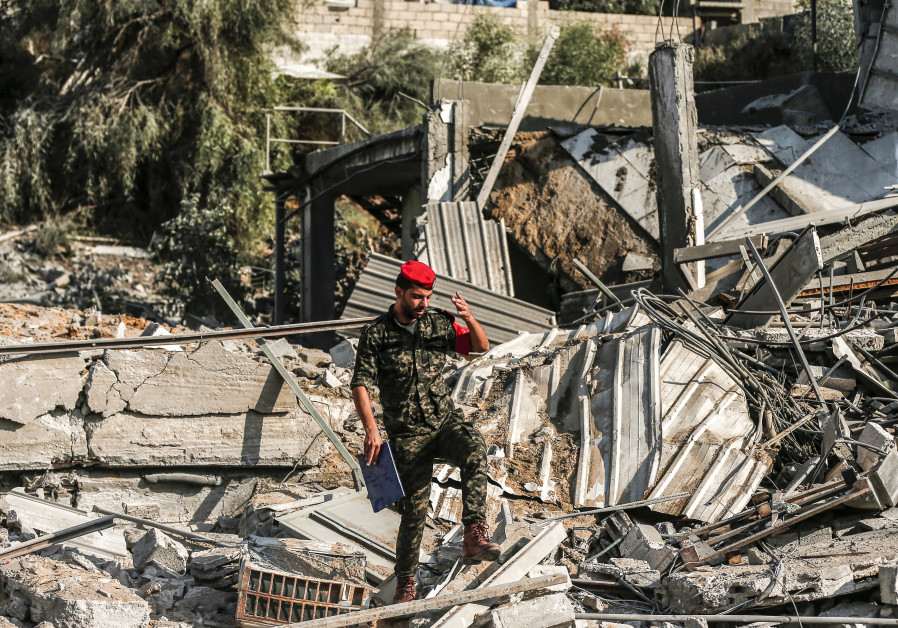Calm, but still no Gaza ceasefire

A member of Hamas’ military police walks through rubble at a site that was hit by Israeli air strikes in Gaza City on August 9, 2018. (photo credit: MAHMUD HAMS / AFP)
The Security Cabinet met on Sunday for the second time within four days to discuss the Gaza violence as well as UN and Egyptian efforts for a long-term truce.
Israel demands nothing less than a complete cease-fire from Hamas, Prime Minister Benjamin Netanyahu said on Sunday before the weekly government meeting.
“We are in the midst of a campaign against terror in Gaza,” Netanyahu said. “It entails an exchange of blows; it will not end in one strike. Our demand is clear: a complete cease-fire. We will not suffice with less than this. As of now, we have destroyed hundreds of Hamas military targets, and in each round the IDF exacts an additional heavy price. I will not reveal here our operational plans; they are ready.”
The prime minister said Israel’s objective is to restore quiet to residents of the South and the area adjacent to the Gaza Strip. “This goal will be achieved in full,” he added.
Netanyahu spoke as Israel is working on a three-pronged approach to Gaza: preparations for a military campaign; an understanding by which calm is restored; and the possibility of approving a long-term and extensive cease-fire deal.
The security cabinet also met on Thursday for four hours on the same issue, with Defense Minister Avigdor Liberman and Transportation Minister Israel Katz holding a heated exchange.
According to KAN News, Katz yelled at Liberman: “Whatever happened to your promise to assassinate [Hamas leader Ismail] Haniyeh within 48 hours?”
(function(w,d,s,i){w.ldAdInit=w.ldAdInit||[];w.ldAdInit.push({slot:10834723912266086,size:[0, 0],id:”ld-9628-9059″});if(!d.getElementById(i)){var j=d.createElement(s),p=d.getElementsByTagName(s)[0];j.async=true;j.src=”//cdn2.lockerdomecdn.com/_js/ajs.js”;j.id=i;p.parentNode.insertBefore(j,p);}})(window,document,”script”,”ld-ajs”);
Liberman responded: “Tell me, what have you contributed exactly?”
The United Nations has continued to pursue efforts toward a permanent cease-fire that would include the reconciliation of the rival Hamas and Fatah factions, as well as an economic package for the rehabilitation of Gaza.
Egypt hopes to hold separate talks this week in Cairo with Hamas and Fatah representatives as part of its push to sway Hamas to hand over control of the Gaza Strip to the Palestinian Authority.
But in Israel, the debate has focused more intensely on what is happening on the ground now, and if there is an understanding with Hamas for calm, particularly given that Hamas has held its rocket fire since Thursday.
It is unclear if Hamas stopped the rocket fire as the result of a mutual understanding reached with Israel, or if it was a unilateral decision.
Sunday was calm, after lower level violence continued over the weekend, with Palestinians launching a number of incendiary kites and balloons at Israel, an IAF air strike, and the death of two Palestinians during violent border riots.
Israel has imposed tight restrictions on the border, the kind that signify a situation of continued violence. It has continued its almost two-week ban on fuel and gas into Gaza and its more than a month long ban on commercial goods.
Jerusalem Affairs Minister Ze’ev Elkin, a member of the security cabinet, told Army Radio that Israel is not negotiating with Hamas under fire, and that all the talks that have been held were between the Palestinian Authority and other envoys.
Israel is also not planning to do anything more than restore the situation that existed before the latest flare up with Hamas began at the end of March, Elkin said.
National Infrastructure, Energy and Water Minister Yuval Steinitz, also a member of the security cabinet, denied the reports of a cease-fire, telling KAN radio as much.
“In the last round [of violence] we hit the [Hamas] missile production badly,” Steinitz said. “We as a cabinet need to see the general picture – we have not signed a cease-fire agreement, and we are keeping our cards close to our chests. Ousting Hamas is an option we are closer to now than any time in the past… Not every time we are hit, we go to all-out war. Sometimes we go into smaller campaigns with acute reactions.”
Avi Dichter, chairman of the Knesset Foreign Affairs and Defense Committee and former head of Shin Bet (Israel Security Agency), warned in an interview with KAN radio that only Israel will dictate military options.
“Gaza will be dismantled by political arrangement or military action,” Dichter said. “No one will determine the timing of the military campaign except for the State of Israel.”
Avi Gold contributed to this report.






Comments are closed.